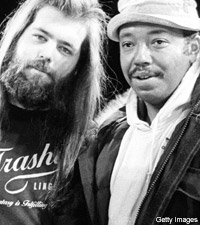#23 – Rick Rubin
| By AMIR SAID (SA’ID) |

Rick Rubin. Def Jam founder and originator of the rap-rock sound.
Since his beginnings with hip hop/rap in the mid-1980s, Rick Rubin has, overall, gone on to become a great music producer in the rock world. There’s no one who could debate otherwise. But his work as a beatmaker compels a different analysis. I’m stern about this because many people (often those trying to name drop and appear more knowledgeable about the art of beatmaking than they really are) throw out Rick Rubin’s name like he’s the chief icon of beatmaking. He’s not. This is no disrespect. Rubin certainly did contribute to the beatmaking tradition. But I think that many have incorrectly focused on his contribution to beatmaking to the detriment of other — often overlooked — more important figures of the beatmaking tradition.
Rick Rubin’s contributions to the cannon of hip hop/rap music and the beatmaking tradition have stood the test of time. In his earliest work with LL Cool J (he produced LL’s entire 1985 debut My Radio), Rubin’s work was personified by the limited prowess of the infamous Roland TR-808 drum machine. Which means it was very (very) sparse, basically all drum track, with a couple of drum fills, highlighted crashes, a stuttering hi-hat (1/8th note-style mostly associated with trap music), break downs, and very basic DJ scratches. Indeed, the most ambitious track, in terms of sheer beatmaking, on My Radio is “Rock the Bell.” But even that song is rather sparse. (Still, Rubin’s work in this space did help signal how drum programming could be in the future.) Rubin didn’t land another track on an LL Cool J album until four years later. And his initial work on LL’s classic Mama Said Knock You Out was replaced by Marley Marl’s beats. (In my interview with Marley Marl, the most detailed interview he’s ever given, Marley Marl describes the backstory surrounding the Mama Said Knock You Out album. You can read my interview with Marley Marl in The BeatTips Manual.)
Following his early work with LL Cool J, Rick Rubin produced the Beastie Boy’s 1986 debut Licensed to Ill. A classic no doubt, and not just for the beatamking, Licensed to Ill ushered forth a new sound that fused together rap and rock. But it must be pointed out that Rick Rubin was a co-producer of this classic album along with the Beastie Boys. Which means it’s perhaps not appropriate to attribute the rap-rock sound to Rick Rubin alone. Indeed, the Beastie Boys were a punk band (prior to converting to a rap group) who were quite knowledgeable about the hip hop/rap culture of their time. Thus, it would be hard to say that Rubin was solely responsible for the rap-rock fusion sound that would go on to influence many. But even in this regard, Run-DMC’s “Rock Box” (produced by Larry Smith,1984) predates Rubin’s rap-rock fusion with the Beastie Boys. So at best, I’d call Rick Rubin the co-originator or co-pioneer of the original rap-rock sound, along with the Beastie Boys and Larry Smith.
As far as Rubin’s work with Run-DMC? Well, the beats of early Run-DMC were really the design of Larry Smith (formerly number 12 on the BeatTips Top 125). But “Walk This Way,” Run-DMC’s massive cross-over hit that featured Aerosmith’s Steven Tyler and Joe Perry, was the brainchild of Rick Rubin. I think this is were the Rick Rubin beatmaking legend gets most of its steam. After he left Def Jam, Rick Rubin reinvented himself. And years later he scored a number of new hits; most notable in hip hop/rap circles is Jay-Z’s “99 Problems.” And I think this is were the Rick Rubin legend took on even more steam. But no matter how you want to look at it, Rubin is one of the important contributors to the beatmaking tradition. I just think it’s best to analyze his position in the beatmaking tradition with more clarity and accuracy.
The music and videos below are presented here for the purpose of scholarship.
Rick Rubin Beats (Songs) Recommended for Study:
SPECIAL NOTE: If you haven’t already, listen to the entire Licensed to Ill album straight through, no interruptions. It’s a hip hop/rap classic and a demonstration of the original rap-rock sound.
“I Can’t Live Without My Radio” – LL Cool beat by Rick Rubin
“Rock the Bells” – LL Cool J beat by Rick Rubin
“No Sleep Till Brooklyn” – Beastie Boys co-produced by Rick Rubin
“Fight for Your Right” – Beastie Boys co-produced by Rick Rubin
“99 Problems” – Jay-Z beat by Rick Rubin

It’s just occurring to me now how much Rock the Bell and 99 Problems sound alike